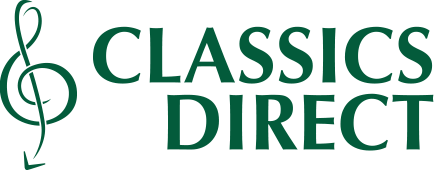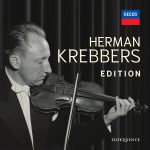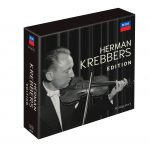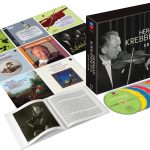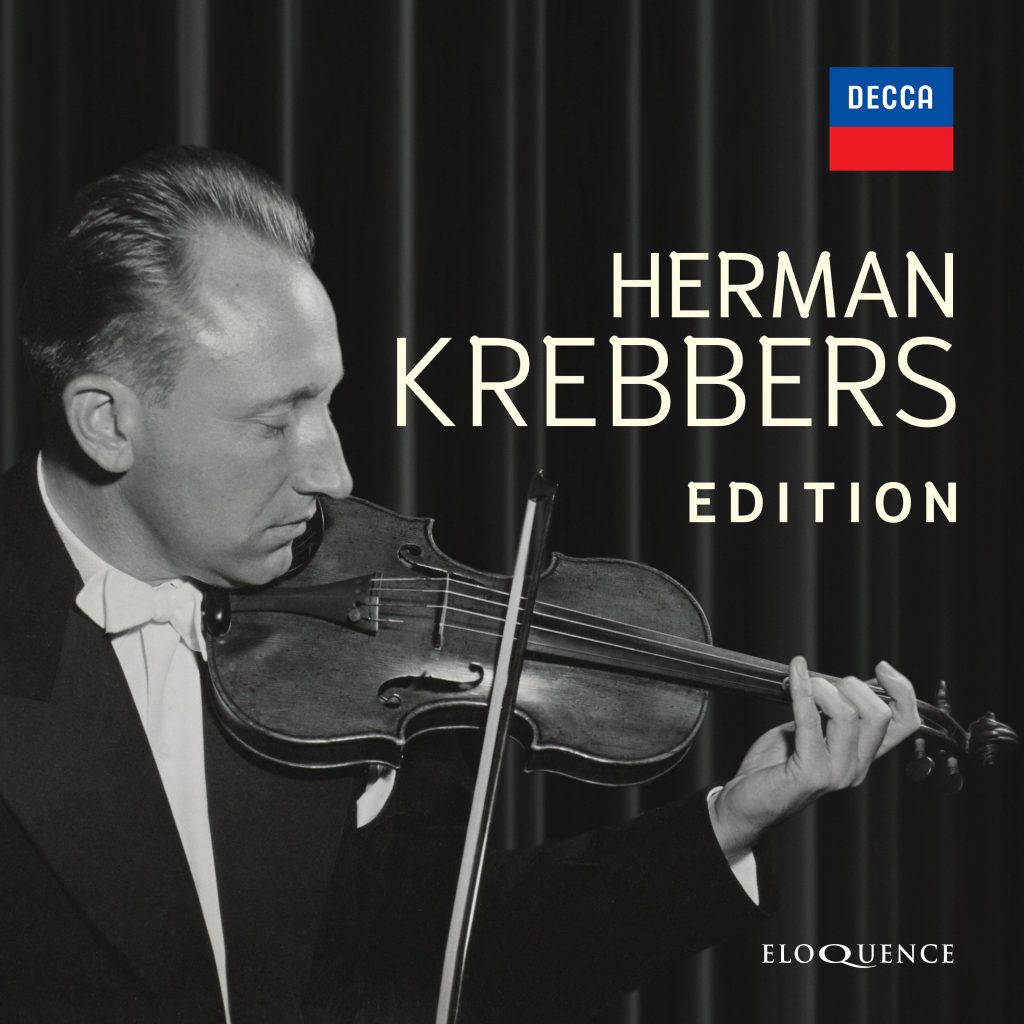
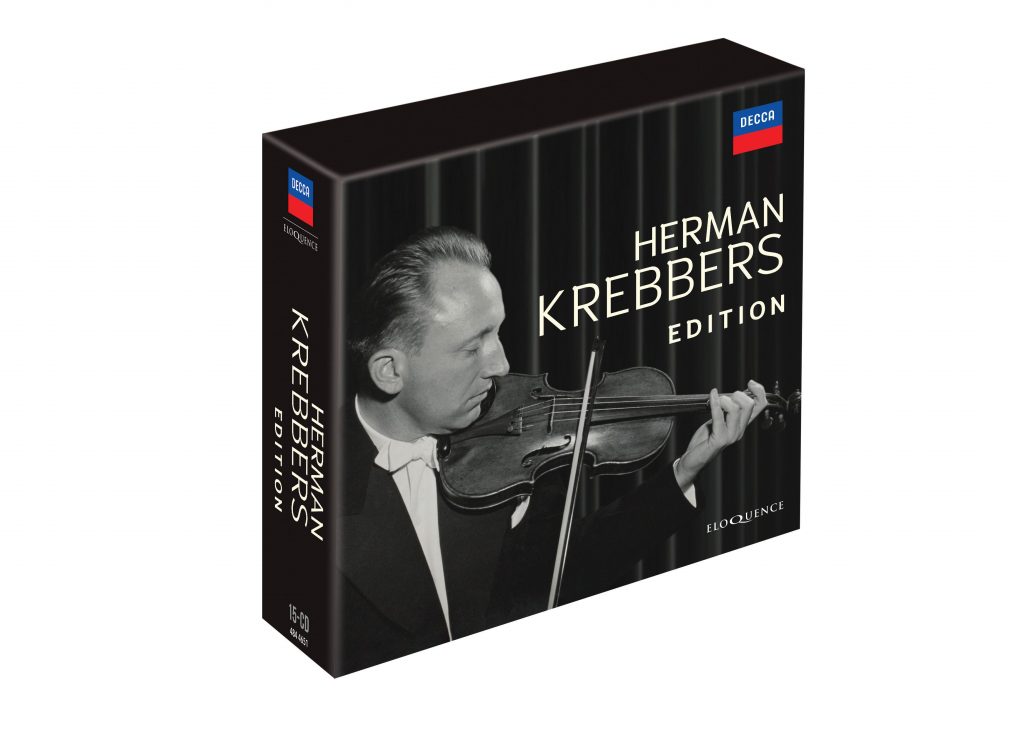
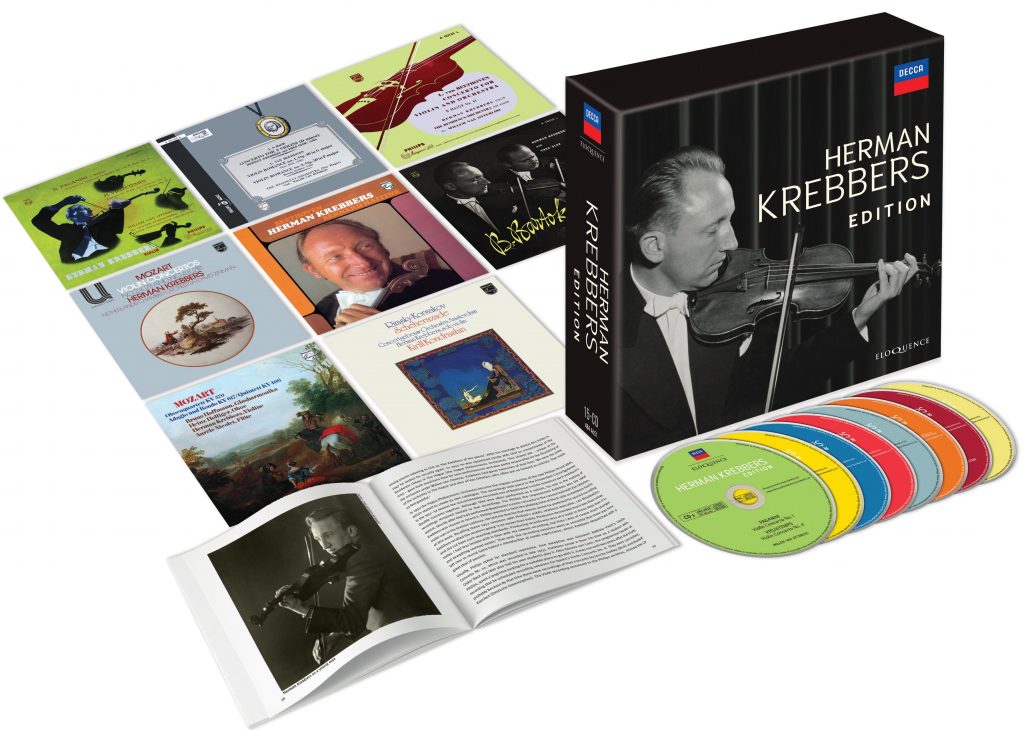
For many years, the concerto recordings made by Herman Krebbers were staples of the Philips LP catalogue. The critical praise and popularity awarded to them was all the more remarkable in view of the fact that Krebbers never pursued the path of an international soloist. Instead, he put his family first and chose the vocation of as an orchestral concertmaster, firstly with the Hague Philharmonic under Willem van Otterloo. With them he made his first recordings in the early 1950s, of Bach and Beethoven and Vieuxtemps.
Around this time, Philips also recorded Krebbers in duo-violin repertoire with his fellow student and lifelong friend Theo Olof. The albums of Bartók Duos and the Double Concertos by Bach and Henk Badings are among several recordings in the collection receiving their first international appearance on CD in this collection, which also includes recordings of the Bruch and Dvořák concertos made in 1973, on the occasion of Krebbers’s 40th anniversary as a soloist.
In 1962 Krebbers became leader of the Concertgebouw Orchestra under Bernard Haitink, and went on to make celebrated second recordings of the Beethoven and Brahms concertos, as well as the taxing peaks of the ‘concertmaster’ repertoire, Rimsky-Korsakov’s Scheherazade and Richard Strauss’s Ein Heldenleben. The box also include the Benedictus from Beethoven’s Missa solemnis, with its long and sublime solo-violin part, in two Concertgebouw recordings made in the 70s with Eugen Jochum and Leonard Bernstein, as well as ‘Erbarme dich’ from Bach’s Matthäus-Passion also with Jochum. Krebbers brought to these parts a soloistic finesse and temperament which was central to the success of the interpretations as a whole.
Krebbers’s parallel career as a chamber musician is represented by a Philips collection of Mozart, including the Oboe Quartet with Heinz Holliger. Further rarities in the set include a second, Swiss-made Bach ‘Double’ Concerto with Arthur Grumiaux, and a Dutch radio recording of Brahms’s Double Concerto with the Concertgebouw’s longstanding principal cellist, Tibor de Machula.
More than 40 years on from Krebbers’s premature retirement after a boating accident, the aristocratic poise and golden warmth of tone to his playing retains its appeal. This comprehensive tribute features a survey of the violinist’s career, and valuable behind-the-scenes insights into many of these recordings, by the Dutch writer Niek Nelissen.
CD 1
PAGANINI Violin Concerto No. 1
VIEUXTEMPS Violin Concerto No. 4
Willem van Otterloo
FIRST INTERNATIONAL CD RELEASE ON DECCA
CD 2
J.S. BACH Concerto for Two Violins
BEETHOVEN Violin Romances Nos. 1 & 2
Theo Olof
Willem van Otterloo
FIRST INTERNATIONAL CD RELEASE ON DECCA
CD 3
BADINGS Concerto for Two Violins
Theo Olof
Symphony No. 3
Willem van Otterloo
FIRST INTERNATIONAL CD RELEASE ON DECCA
CD 4
BEETHOVEN Violin Concerto*
Willem van Otterloo
Sanctus (Missa solemnis)
Eugen Jochum
*FIRST RELEASE ON CD
CD 5
VIOTTI Violin Concerto No. 22*
SVENDSEN Romance Op. 26*
SAINT-SAËNS Danse macabre; Introduction et Rondo Capriccioso*; Havanaise*
Willem van Otterloo
Bernard Haitink
*FIRST INTERNATIONAL CD RELEASE ON DECCA
CD 6
J.S. BACH Concerto for Two Violins
Arthur Grumiaux; Arpad Gérecz
Erbarme dich (Matthäus-Passion)
Marga Höffgen; Eugen Jochum
BRAHMS Double Concerto*
Tibor De Machula; Henk Spruit
*FIRST INTERNATIONAL CD RELEASE ON DECCAC
CD 7
BRAHMS Violin Concerto°
BRUCH Violin Concerto No. 1*
Hein Jordans
°FIRST RELEASE ON CD
*FIRST INTERNATIONAL CD RELEASE ON DECCA
CD 8
MOZART Violin Concertos Nos. 4 & 2
David Zinman
CD 9
BRAHMS Violin Concerto
Bernard Haitink
CD 10
BEETHOVEN Violin Concerto
Bernard Haitink
Sanctus (Missa solemnis)
Leonard Bernstein
CD 11
BRUCH Violin Concerto No. 1
Libor Pešek
DVOŘÁK Violin Concerto
TCHAIKOVSKY Souvenir d’un lieu cher
Anton Kersjes
FIRST INTERNATIONAL CD RELEASE ON DECCA
CD 12
BARTÓK 44 Duos for Two Violins
Theo Olof
FIRST RELEASE ON CD
CD 13
MOZART Oboe Quartet; Adagio and Rondo; Oboe Quintet, K. 406 (after String Quintet)
Heinz Holliger; Karl Schouten; Judith De Munk-Gerö · Jean Decroos
FIRST INTERNATIONAL CD RELEASE ON DECCA
CD 14
RIMSKY-KORSAKOV Scheherazade
RAVEL Tzigane
Kirill Kondrashin
STRAUSS Don Juan
Bernard Haitink
CD 15
STRAUSS Also sprach Zarathustra
Ein Heldenleben
Bernard Haitink
“Herman Krebbers can hold centre stage very well. He plays Brahms with utterly luminescent tone, an aristocratic confidence in the face of technical hurdles, and a terraced shaping of phrases and dynamics that freshly confronts expressive meanings.” High Fidelity, April 1980 (Brahms – Haitink)
“The most satisfactory, natural, and realistic-sounding of all versions … also the most magisterial, lucid, and illuminating interpretation, with the finest solo-violin playing by Herman Krebbers.” High Fidelity, June 1981 (R. Strauss: Also sprach Zarathustra)
“Certainly no violinist has ever realized the solo passages as graciously and as free from any taint of sentimentality as Herman Krebbers … one of the Himalayan peaks of the all-time worldwide discography.” High Fidelity, December 1974 (R. Strauss: Also sprach Zarathustra)
“An expansive, voluptuous, finely detailed approach … [Krebbers] is absolutely attuned to this concept in his eloquent solos, his colleagues are all on top form, and everything fairly glows.” Stereo Review, December 1980 (Rimsky-Korsakov: Scheherazade)
“Krebbers is ideally suited to the Bruch concerto: he has a first-rate technique, his tone is of the sweetest and in particular he can spin out a fine pianissimo without losing body or quality.” Gramophone, October 1968 (Bruch – Jordans)
“Haitink proves a splendid Straussian … He then has the great advantage of Krebbers as his soloist … a fine solo artist with natural presence.” Gramophone, January 1971 (R. Strauss: Ein Heldenleben)
“Krebbers emerges as the complete solo player … There is a dramatic presence about his reading of the Dvořák … We are reminded that, only among other things, is he the leader of the Concertgebouw Orchestra.” Gramophone, August 1974 (Dvořák: Violin Concerto)
“A performance of real character, dark, imposing and superbly recorded.” Gramophone, April 1975 (Brahms: Violin Concerto – Haitink)
“Krebbers has a lovely tone and his intonation, even in the highest reaches, is absolutely sure … The slow movement is most eloquent, played from the heart to the heart.” Gramophone, February 1976 (Beethoven: Violin Concerto – Haitink)
“Krebbers is an uncommonly fine player and his reading is beautifully sustained and satisfying.” Gramophone, May 1976 (Beethoven: Violin Concerto – Haitink)
“There is no violinist I am more eager to hear on record than Herman Krebbers … In Mozart that degree of restraint combined with consistent imagination in the phrasing makes for results that are both stylish and persuasive.” Gramophone, June 1976 (Mozart: Violin Concertos Nos. 2 & 4)
“Unquestionably the best buy for this work, irrespective of price.” Gramophone, October 1976 (Beethoven: Violin Concerto – Haitink)
“Perfect timing, exemplary articulation, and music in every semiquaver.” Gramophone, May 1978 (Mozart: Chamber Music)
“His playing is wonderfully expressive, penetrating to the very core of Brahms’s inspiration.” Gramophone, June 1978 (Brahms: Violin Concerto – Haitink)
“A great orchestra from northern Europe led by a famous violin soloist whose style is the antithesis of sensuous romanticism and whose portrayal of the seductive storyteller is essentially gentle, even introvert…” Gramophone, November 1980 (Rimsky-Korsakov: Scheherazade)
“Herman Krebbers, a player of soloistic skills, is a sweet enough Scheherazade to seduce but reserved enough so that she holds her cards close to her chest.” Gramophone, December 2017 (Rimsky-Korsakov: Scheherazade)



